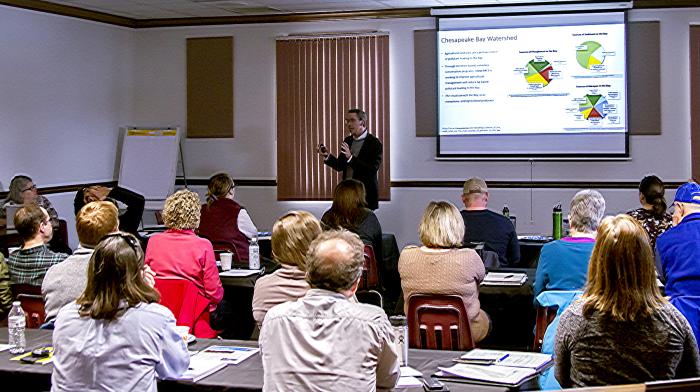Virginia Conservation Partners
Virginia NRCS works closely with sister agencies, state and local governments and advocacy groups with similar goals to protect the Commonwealth's precious natural resources.
We're big believers in the team approach to preserving the state's working lands, protecting at-risk species and wetland ecosystems and helping agricultural operations become more sustainable, productive and profitable. These strong conservation partnerships have yielded big dividends to help us more effectively connect with beginning and historically underserved farmers and provide technical and financial assistance to operations of all sizes.
Who We Work With
NRCS leverages Farm Bill funding with partner contributions to expand our cadre of technical experts available to work one-on-one with Virginia landowners and watermen. Our ever expanding team includes, but is not limited to:
- Agribusiness
- Agricultural and environmental groups
- Conservation organizations
- NRCS Earth Team volunteers
- State and federal agencies
- Producer organizations
- Professional societies
- Universities
- Virginia Association of Soil and Water Conservation Districts
How We Do It

Collaboration to Set Goals and Priorities
- State Technical Committee - Advisory body that provides information, analysis and recommendations to the state conservationist on a variety of policy issues.
- Local Working Groups - Subcommittees of the State Technical Committee that provide field-level recommendations on local and state natural resource priorities and criteria for conservation activities and programs.
- Regional Initiative Teams - Virginia's Smith Creek Partnership has been going strong for more than 10 years and continues to coordinate efforts to help farmers and residential landowners voluntarily implement best management practices to reduce nutrient and sediment runoff into the Chesapeake Bay.
Grants and Agreements to Implement Joint Initiatives
- Regional Conservation Partnership Program (RCPP) - Standalone program that promotes coordination of NRCS and partner activities to address on-farm, watershed and regional natural resource concerns.
- Conservation Innovation Grant (CIG) Program - Targeted funding offered at the state and national levels to evaluate and accelerate adoption of new approaches to natural resource protection.
- Joint Chiefs Landscape Restoration Projects - Collaboration with the U.S. Forest Service and other partners to integrate treatments on federal, state and private forested lands that support healthy ecosystems and improved water quality in the Upper and Lower Cowpasture watersheds, Northern Shenandoah Mountains and Central Appalachia.
- People's Gardens - Community plots grow fresh, healthy food and support a resilient, local food system; teach people how to garden using sustainable practices; and nurture habitat for pollinators and wildlife, and greenspace for neighbors to gather and enjoy. Virginia currently has one garden at Fairfield Middle School in Henrico County.
- State-Level Initiatives - Virginia NRCS has worked through agreements to put more boots on the ground to provide technical assistance to producers and landowners. Our Private Lands Biologist (PLB) program is among the most successful in supporting statewide habitat creation and management activities.
Opportunities for Future Collaboration
Funding announcements for USDA grant offerings are posted on grants.gov. Potential partners seeking letters of collaboration to strengthen application packages for conservation and outreach project grants should submit these requests to the Virginia State Office. Download the document below to get more guidance on the process and documentation required.

